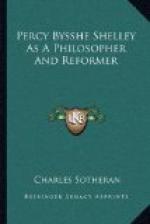Shelley believed in reformation, not revolution; and in the “Revolt of Islam” and his Irish pamphlets, we find him advocating a bloodless revolution, except where force was used, and then force for force, if compromise were hopeless. His idea was ever the foundation of political systems founded on that of this country, or on the ancient Greek Republic. He says:
“The study of modern history is the study of kings, financiers, statesmen, and priests. The history of ancient Greece is the study of legislators, philosophers, and poets; it is the history of men compared with the history of titles. What the Greeks were was a reality, not a promise. And what we are and hope to be is derived, as it were, from the influence of these glorious generations.”
Hoping almost against hope for the regeneration of his country, he submitted to the people of England a proposal for putting to the vote the great reform question, which was filling the public mind; but he was conscious that in the then unprepared state of public knowledge and feeling, universal suffrage was fraught with peril, and remarks that although
“A pure republic may be shown, by inferences the most obvious and irresistible, to be that system of social order the fittest to produce the happiness and promote the genuine eminence of man. Yet nothing can less consist with reason, or afford smaller hopes of any beneficial issue, than the plan which should abolish the regal and the aristocratical branches of our constitution, before the public mind, through many gradations of improvement, shall have arrived at the maturity which shall disregard these symbols of its childhood.”
An essay has come down to us (unhappily unfinished), in which he argues in favor of “Government by Juries.” It is but a fragment; and yet it shows us that his mind was ever in search of the right solution of the question of proper legislation for the masses. William Pitt, with enemies on every side, publicly acknowledged the extraordinary genius which impelled the American revolution, and admired the constitution of this country, as well as the masterly character of the “Declaration of Independence.” In unstinted praise does he speak of the learning and remarkable public spirit of the signers. With equal praise, I am confident, everyone must eulogize the “Declaration of Rights,” compiled by Shelley, which he put before his countrymen sixty-three years ago. Therein he has given the whole of his conception of the correct theory of government, and it cannot fail to be read by advanced minds with feelings of genuine pleasure.
The race has suffered through its long martyrdom with the horrors of war. One tyrant after another, to aid his accursed ambition or revenge his spite upon a brother monarch, has cursed the unhappy earth and humanity with the terrors of long-continued devastation and bloodshed. With burning pen has Shelley depicted war in its most hideous aspects, and by most beautiful comparisons has he shown us the sublimity of peace. He points out, that




